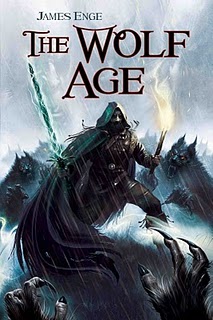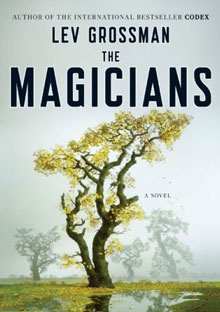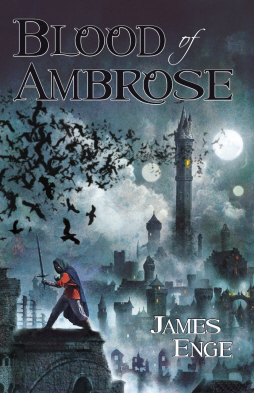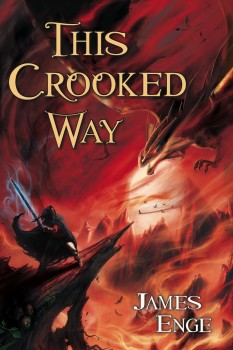A Review of The Wolf Age by James Enge
 The Wolf Age, by James Enge
The Wolf Age, by James Enge
Pyr (465 pages, $17.00, Nov 2010)
Yes, here I am again, to talk about James Enge. Specifically, The Wolf Age.
You know, I wrote about Blood of Ambrose, and I wrote about This Crooked Way, but this time I’m really stymied. I’m sitting here on my bed, laptop on my knees, feeling unworthy of the task ahead, and I have to ask myself:
“Now, Self, are we prepared to write about the third Morlock Ambrosius novel in a calm, clear, concise manner? Are we willing to dispense with our usual capital letters and exclamation points (I used plenty of those in my personal blog about this book, oh, believe me), and give a proper synopsis, and cite examples of AWESOMENESS and, and, not disintegrate into helpless wails of, But Lev Grossman already said it better than I could! It’s right there in the BLURB!”
And then I said:
“Well, Me, it’s tricky work all right. But someone’s got to do it! …Someone other than Lev Grossman.”
(I didn’t know who Lev Grossman was when I read The Wolf Age, but I envied his blurb, and then randomly picked up and read most of The Magicians before I realized that this Lev Grossman and that Lev Grossman were the same Lev Grossman!!! The Magicians is chilly-cool: like a cocktail of vodka on diamonds, lit with foxfire. So, whatever, I guess it’s okay that a bestselling author of a really good novel said what I meant to say about James Enge before I had a chance to say it. This being:
“James Enge’s books are like a strange alloy of Raymond Chandler, Fritz Lieber, Larry Niven and some precious metal that is all Enge’s own. They’re thrilling, funny, and mysteriously moving. I see 10 things on every page I wish I’d written. I could read him forever and never get bored.”
Speaking of cocktails, Morlock gets really, really drunk in The Wolf Age. For a very long time. But I’m getting ahead of myself here. Oops. Should I have said “Spoiler Warning”? Well, I’ll try not to give too many of them.
 The Wolf Age casts our crookbacked hero into the desolate northern plains. He has abandoned all his friends in the hopes that by distancing himself from them, he’ll manage not to get them killed. Everything is very bleak and terse, including his mood, and then Morlock kills a lot of werewolf slavers in a fight, is chased by a really big Zeppelin-like slave ship, runs away to the ocean with some refugees, nearly drowns, and then gets taken captive and hauled off to the werewolf city Wuruyaaria. All by Chapter Three.
The Wolf Age casts our crookbacked hero into the desolate northern plains. He has abandoned all his friends in the hopes that by distancing himself from them, he’ll manage not to get them killed. Everything is very bleak and terse, including his mood, and then Morlock kills a lot of werewolf slavers in a fight, is chased by a really big Zeppelin-like slave ship, runs away to the ocean with some refugees, nearly drowns, and then gets taken captive and hauled off to the werewolf city Wuruyaaria. All by Chapter Three.
I have to pause here, ‘cause…
Isn’t “Wuruyaaria” such a badass name for a city?
It’s Enge’s thing with languages. He’s dang good at them. So is Morlock (shocking!), who spends a good deal of his enslavement learning to speak in werewolf.
See, werewolves have a language all their own (two, actually), and the thing is, as a reader, when you sound out the words and names, speak them aloud, feel the shape of them reshaping your mouth, you’re already pretty much one step away from swearing off silver and howling at the moon. Enge’s prose has bite!
You know how werewolves have two forms, right? Being werewolves and all. In Enge’s world, the wolf form is “night shape,” the human form is “day shape.” In night shape, the werewolves use Moonspeech. In day shape, they use Sunspeech. Morlock learns both, while simultaneously going mad from a glass spike in his head. He is definitely a man who puts new meaning to the term “multitask,” and it’s awfully fun to watch him do it, even when you’re cringing at the blood-spattered fight scenes that seem to happen every other page.
Which is not to say that the fight scenes aren’t all that AND a bag of throwing stars!
Enge can write a fight scene that will jumpstart your sympathetic nervous system with a whiz-bang-BOOSH! It’s all adrenalin all the time, and the reader (like this reader), who enjoys those high levels of violence, by that enjoyment becomes complicit in it, utterly immersing into werewolf ways and mores. Like Phil Ochs sings:
“But the hands that are applauding are slippery with sweat
And saliva is falling from their smiles.”
The reader is aware, while cheering on Enge’s heroes (among others, Rokhlenu, who is absolutely charming. And if you think he’s great, wait ‘til you meet Wuinlendhono, because she totally steals every scene she’s in), and hoping all the good guys win, that Enge being the author he is, and Wuruyaaria being the sort of city it is – in the middle of election year, with champions duking it out to the death in the arena – the chances of one’s favorite characters coming out the other end of this book unscathed, or even with their hearts still located in the vicinity of their chests, are pretty dang slim.

Backing up a little… I don’t want to spoil much about the spike in Morlock’s head, but I did want to mention that, for me, some of the most poignant parts of the novel arise in consequence of it.
In his previous book, This Crooked Way Enge taps some deep themes of mortality, about the disintegration of memory and the repercussions of magically prolonging a life beyond the point where it is useful or dignified or even aware of itself anymore.
He taps another such raw nerve in The Wolf Age, with deftness and subtlety. What happens if you lose, perhaps irrevocably, the quality or skill that has defined you for most of your life? Morlock’s life has been particularly long. Take a Maker, whose main tool of making is his hands. Then hear him say, periodically and with dreadful serenity, “I seem to be dropping things with my left hand.” Then see if you blame him for drinking that bowl of wine at a party.
You’d think a man who’s lost all his friends, been enslaved, and got his head spiked wouldn’t have far to fall. Boy, would you be wrong.
Does this make The Wolf Age sound like one long unraveling? I assure you it is not. I don’t know how he does it, but for all that this novel is terrifically violent, rife with desperate measures and certain doom, Enge manages to infuse his characters with wit, fortitude, sweetness and some very sexy sex. He doesn’t ignore friendship or food or anything else that makes a book worth reading and a life worth living.
In one sense, this is a novel about descending. It begins with a descent into water, and ends with a descent into earth. These encapsulate Morlock’s descent into slavery, madness, and drunkenness, with a lot of physical damage in between. But the thing is – in an Engean descent, it’ s not about leaving them there, stomping extra hard on their broken bits, and watching them despair and die (as in, for example, an Aronofsky film). In an Engean descent, it is about watching them scrabble up again by their fingernails even from the very pit of the grave. So it’s also about ascent. It’s about Hope.
I had two problems (in retrospect) with The Wolf Age. And when I say problems, please don’t think that means I didn’t love the splanchic stuffing out of it. Because I did. In case you couldn’t tell.
The first is The Strange Gods.
 It’s strange – heh, heh – because some of the most fascinating and well-crafted prose abides in the intervals amongst these Gods, but I just didn’t care for them much as characters. I felt no connection with their motives, desires or conspiracies. To me, they were simply necessary plot devices. I recognized very clearly that the Strange Gods will indeed be some other reader’s favorite part of the book. They, in fact, put me very much in mind of Roger Zelazny’s Lord of Light, which I enjoyed – but whenever I encountered them, I mostly just wanted to get to the next part with Morlock. I have a Thing for Morlock.
It’s strange – heh, heh – because some of the most fascinating and well-crafted prose abides in the intervals amongst these Gods, but I just didn’t care for them much as characters. I felt no connection with their motives, desires or conspiracies. To me, they were simply necessary plot devices. I recognized very clearly that the Strange Gods will indeed be some other reader’s favorite part of the book. They, in fact, put me very much in mind of Roger Zelazny’s Lord of Light, which I enjoyed – but whenever I encountered them, I mostly just wanted to get to the next part with Morlock. I have a Thing for Morlock.
The second is…
Okay. Enge writes great female characters. I already knew that from his previous novels and stories. I was passionately looking forward to meeting new and formidable ladies in The Wolf Age. And I did – he delivered! Don’t get me wrong. But he made me wait a long time for them. And then, the first sight we have of one is during a brutal rape scene. I admit it put me off. I thought, “Really? Aren’t we tired of this yet?”
Nobody is spared in The Wolf Age – and Morlock least of all – but the rape scene was a nasty dash of dirty ice-water to the face all the same. Within the text, the characters (including the victim) handle the rape and its aftershock in a realistic, thoughtful manner. It was not gratuitous – not any more than all the rest of the violence, anyway. But with so few female characters, and after waiting so long, having the first one introduced in such a way really soured the book for me for a time.
But then along came the swaggering, cursing, cool-eyed, night-eyed Wuinlendhono, calling people, “My cutlet,” and “My gravy bowl,” and holding her own against the dudes. And the other main female character, the victim, began taking on more dimensions than just “the victim,” until she was as surprising and nuanced as any of them, and then some.
So much for my complaints! Shall I spend the rest of the review typing little <3 <3 <3 symbols and saying things like OMFG I LOVE THIS BOOK? I could, you know. There’s so much more to this novel than I’m telling you. Like the Scariest Unicorns Ever. And the ratty rotten meat puppet thingies. And the tooth necklaces. There is so much cool in this novel!
Which just means you’ll have to read it. Which you should! Do it! Or know the meaning of the words, “KREE-LAOW!”
Tim Pratt gave a rave review of The Wolf Age in the November Locus. Not quite as many caps and exclamation points, but still pretty hefty endorsement.
I’ve read it! Tim Pratt is excellent at hefty endorsements. If I were Tim Pratt, I would not have to use exclamation points and capital letters, because I would be Tim Pratt, and therefore excellent.
😀
But when I have two cents, I’ll throw ’em in. For the heck of it.
[…] Gate blogger, and international man of mystery — appear on the scene with his third novel The Wolf Age, than Western Civilization finally begins to acknowledge his genius. The latest accolades are […]